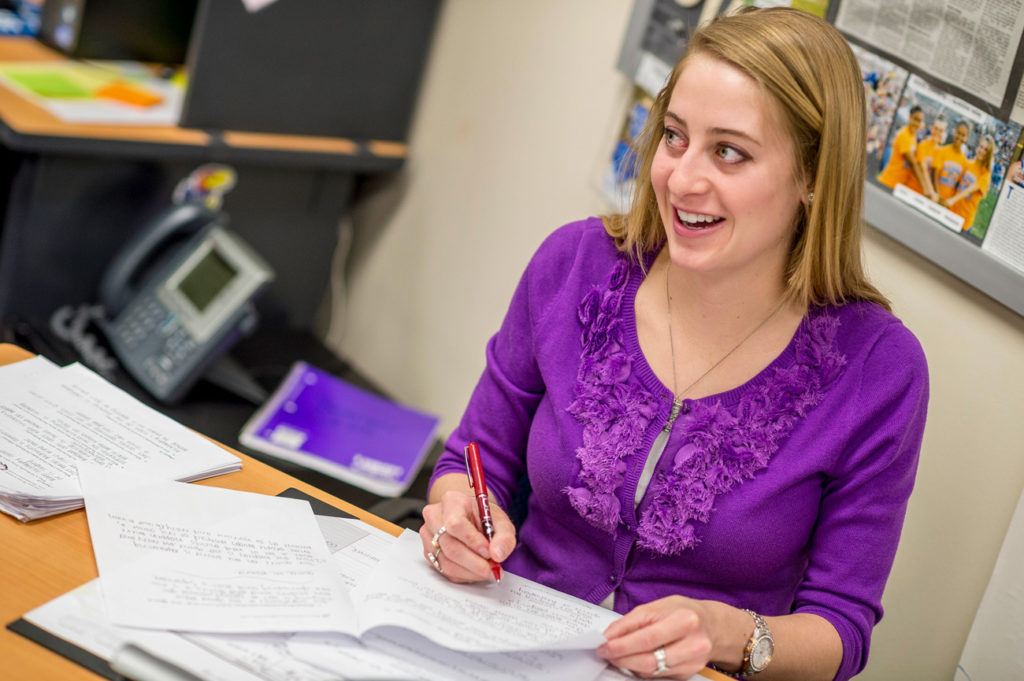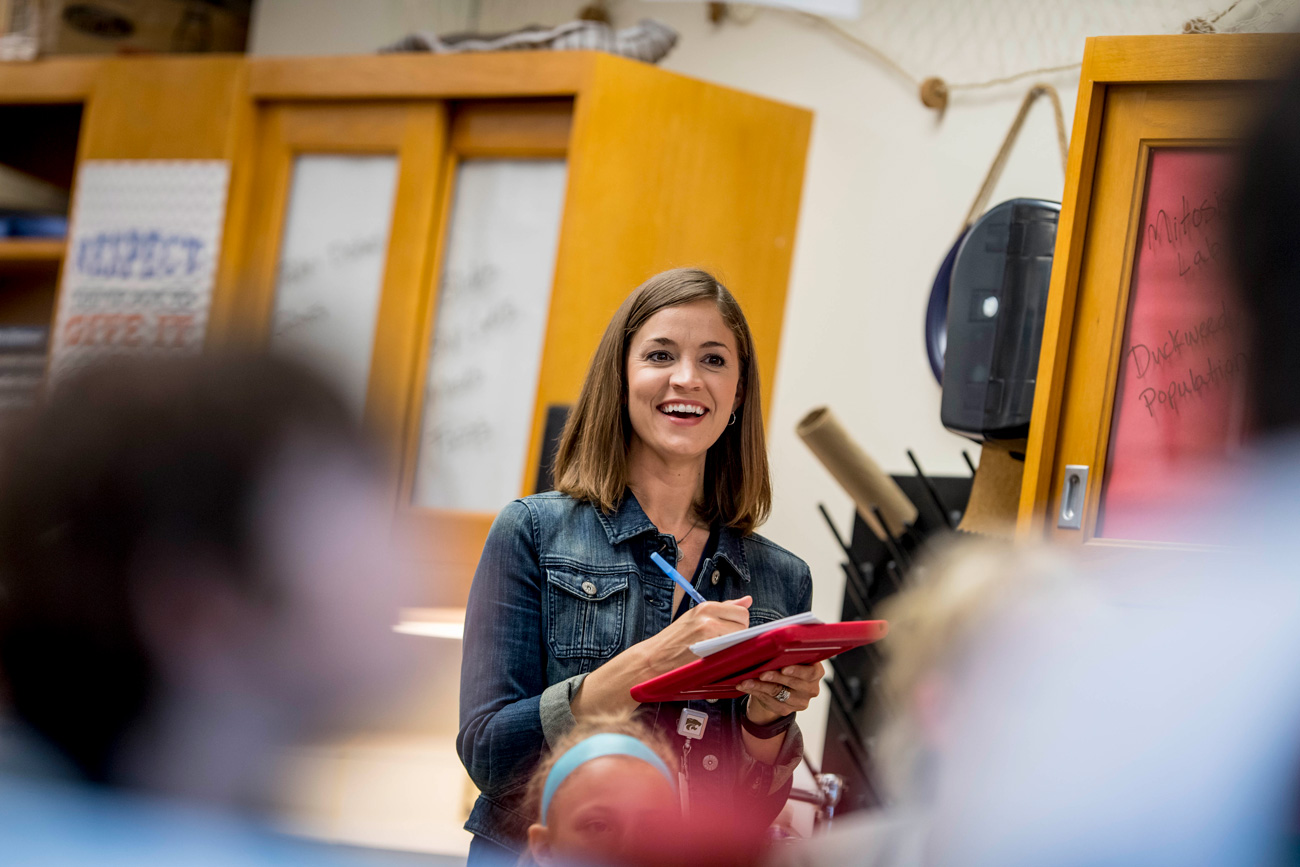
Renee Linder
Department Assistant, Data Manager & School of Education Licensure Officer
What is an education degree?
If you want to be a pivotal figure in the next generation of learners, then a degree in education is for you. Learn how to inspire students, encourage potential, and create lasting impressions that shape the decision-making process.
Develop the skills to foster meaningful connections and drive positive change. Whether it is elementary, secondary, special, or physical education, educators arguably have one of the most important jobs in the world.
Why study education at Baker University?
Baker University’s education program gives you the necessary skills for a successful career. Here you will gain classroom knowledge and hands-on experience in educating children from various backgrounds. Not everyone learns the same way, but everyone deserves the same educational opportunities.
Baker University works closely with local school districts and districts in the Kansas City area to secure student-teaching positions to provide the necessary tools to excel before and after graduation.
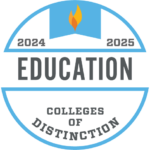
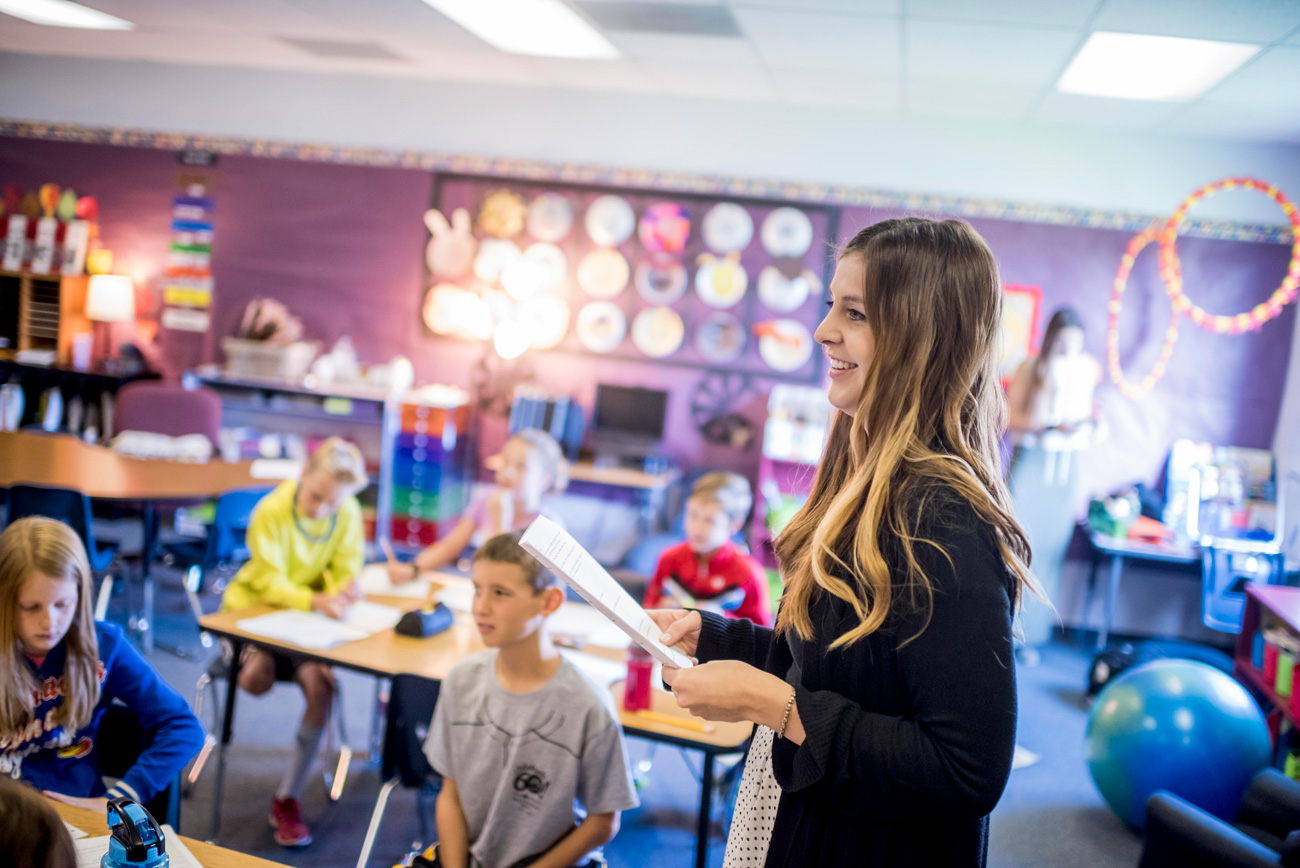
Career Opportunities for Education Majors
- Educator
- Special education teacher
- Principal
- Education administrator
- Career counselor
- Academic coach
- Instructional coordinator
- School counselor
Coursework
Education Course Descriptions
ED 100 – Teaching as a Career 1 hr. Every semester
This course is designed to introduce prospective educators to the teaching profession and to explore the field of teaching as a career. It is designed specifically for students who are transferring in ED 243 Introduction to Education. Students will research state licensure requirements and examine career options. They will receive a current Teacher Education Policy and Programs Handbook, write a teaching philosophy, and interview a practicing licensed teacher.
ED 243 – Introduction to Education 3 hrs. Every semester
This course is designed to introduce prospective educators to the teaching profession and to explore the field of teaching as a career. Students will research state licensure requirements and examine career options. They will receive a current Teacher Education Policy and Program Handbook, write a teaching philosophy, and interview and a practicing licensed teacher. The course content also includes instruction in the social, historical, and philosophical foundations of education, as well as components of lesson design. Course emphasis is placed on the professional attitudes crucial for those working with young people: awareness of the value of education, respect for all students, acceptance of diversity and its impact on learning, and an awareness of the teacher’s role as facilitator of student learning. At-risk students are researched and groups presentations cover approaches for successful experiences for these students. NOTE: Physical Education and Health majors need to take PE 210 in place of ED 243.
ED 244 – Education Field Practicum I 1 hr. Every semester
This one-hour practicum is designed to provide students with an initial classroom experience. After being assigned a mentor teacher, students will: assist in various areas whenever appropriate, observe and record effective classroom management, and possibly facilitate the implementation of accommodations with students as needed. If you are seeking PreK-12 license, this practicum also provides you with the opportunity to spend time in a Pre-Kindergarten setting. Please see instructor for details. Prerequisites: ED 100 or 243 and sophomore status. P/NC
ED 262 – Children’s Literature 3 hrs. Fall only
This course emphasizes the reading, evaluation, and presentation of literature appropriate for elementary and middle-level learners. The class will explore various literary genres through the reading of authentic children’s books, poetry collections, picture books, and novels. Specific topics of study include: the history of children’s literature; diversity of characters, settings, plots, themes, and cultures; and prominent authors and illustrators. A variety of literary presentation and teaching methods will be explored. This course does not count toward the major in English. Prerequisites: ED 100 or 243. (Cross-listed as EN 262.)
ED 264 – Foundations of Classroom Management 1 hr. Every semester
This course is an introduction to the theory and application of management techniques that provide the basis for an effective, efficient, and positive classroom climate. Techniques that result in effective use of time, efficient use of materials, and improved student behavior are identified and practiced. Emphasis is placed on the importance of classroom dynamics in creating a proactive approach to classroom management. Students will create a comprehensive classroom management plan. Prerequisites: ED 100 or 243. NOTE: This course is not required for Physical Education and Health majors.
ED 265 – Technology for Teachers 1 hr. Every semester, hybrid course
This course will feature inquiry-based constructivist activities which stress the creation of authentic and useful classroom products. The activities will focus on three concepts: 1) technology skills that all educators should possess to enhance instruction in the classroom, 2) activities for students to complete that will increase meaningful learning about technology and how to integrate it into the classroom, and 3) the creation of a website that students can use as a beginning portfolio. The instructional uses of the Internet, word processing, presentation options, Internet safety, multimedia, and online tools will be components of this course. Prerequisites: ED 100 or 243. NOTE: This course is not required for Physical Education and Health or Music Education majors.
ED 309 – Evaluation Techniques for the Classroom 3 hrs. Every semester
This course focuses on the decision-making skills practiced by teachers in developing effective classroom assessments. Candidates will explore the processes, as well as the products, of assessment as they utilize information gathered at the diagnostic, formative, and summative phases of assessment to guide instruction. The strengths and weaknesses of both formal and informal assessment techniques will be examined. Candidates will develop tests and authentic assessments for students with varying abilities and learning styles. Rubrics that inform students of expected criteria and quality levels will be developed. Participants will acquire fundamental statistical concepts to interpret standardized test results for use in a videotaped simulated parent-teacher conference. A computerized grade book program is examined. In addition, tenure/contract laws and case law dealing with schools are discussed. Prerequisites: ED 100 or 243. NOTE: This course is not required for Physical Education and Health majors.
ED 313 – Bilingual Education hrs. Every semester
This course provides an overview of bilingual education to include the history, policies, programs, and research on effective bilingual education programs. Topics covered include: 1) language acquisition theories; 2) the role of primary language literacy in second language acquisition; 3) second language instruction, using methods for teaching English as a Second Language (ESL) and content area instruction through the Sheltered Instruction Observation Protocol (SIOP); and 4) culturally responsive teaching strategies will be emphasized. This course will also provide students with opportunities to explore effective tools to enhance speaking and writing in a language other than English, allowing students to increase their level of awareness, knowledge, and skills that will render them more effective teachers with linguistically and culturally diverse students and families. Prerequisites: ED 100 or 243.
ED 320 – Education Field Service Practicum II 1 hr. Every semester
This one-hour practicum is designed to provide students continued classroom experience. After being assigned a mentor teacher, students will: assist in various areas whenever appropriate, lead whole-class and small group learning, observe and record effective classroom management, and possibly facilitate the implementation of accommodations with students as needed. If you are seeking a PreK-12 license, this practicum also provides you with the opportunity to spend time in a Pre-Kindergarten setting. Please see instructor for details. Prerequisites: ED 100 or 243, and 244. Note: This course is not required for Physical Education and Health majors. P/NC
ED 322 – Education Field Service Practicum III 1 hr. Every semester
This one-hour practicum is designed to provide students with a specialized classroom experience tailored to meet their individualized needs. Students will meet with the PDS Coordinator to devise a course of study that best addresses the student’s needs and the relevant course objectives. Prerequisites: ED 320 and department recommendation. P/NC
ED 331 – Methods for Teaching Elementary and Middle-Level Mathematics 3 hrs. Spring only
This course examines the methods, materials, and activities that are appropriate for use in grades K-8 mathematics programs. Students will explore their own attitudes toward mathematics, plan lessons with problem solving as the primary focus, and work with school-aged pupils. The course is based on national and state mathematics standards.
Prerequisites: ED 100 or 243 and MA 262, or Department Chair approval.
ED 333 – Teaching Economics and Geography in the Classroom 3 hrs. Spring only
This course will provide students with the foundations of content for teaching economic and geographic knowledge, concepts, and skills. Students will develop the knowledge and understanding of significant terms, ideas, people, places, and events of each discipline. State and national standards for economics and geography will be addressed to ensure students understand the essential concepts, principles, and interrelationships that will be required for licensure and classroom teaching. The knowledge and understanding gained from this course will enable students to create effective classroom learning experiences related to economics and geography. Prerequisites: ED 100 or 243.
ED 342 – Language and Communication Arts in the Secondary English Classroom 3 hrs. Fall term, biennially in even years
This course is an in-depth study of content and methods needed for the teacher in the secondary English language arts classroom. Language and communication skills as they relate to reading, writing, listening, and speaking are examined. Current research in best pedagogical practices in the secondary classroom is considered and demonstrated through lesson planning and presentation. Additional emphases in this course include understanding developmentally appropriate practice for the adolescent learner, knowing and applying national and state standards in curriculum planning, creating a motivating classroom environment, using technology in the language arts classroom, assessing secondary English language arts students and their work, considering the needs of diverse and special-needs learners, and becoming a reflective practitioner. Prerequisites: ED 100 or 243.
ED 343 – Educational Psychology 3 hrs. Every semester
This course investigates many psychological factors that impact learning. Students will investigate a number of the leading theories that relate to student learning and development. Other areas investigated include: learner engagement, multiple intelligences, constructivism, managing the classroom environment, meaningful instruction, information processing, and motivation and diversity of students, as well as teacher dispositions. Students will examine the psychological aspects of becoming a professional in a classroom, which involve a commitment to learners, reflective decision making, and professional knowledge. Prerequisites: PY 111 and ED 100 or 243.
ED 345 – Psychology of the Exceptional Learner 3 hrs. Every semester
The purpose of this course is to provide students with an overview of the field of special education and a basic understanding of special education law, differentiated instruction, and best practices, including technology applications specifically designed to accommodate students with special needs. Students learn about the etiology, identification, and characteristics of the major disabilities recognized under federal law and about students with high cognitive ability. Emphasis is placed on classroom management and teacher decision making, as well as the professional attitudes and responsibilities related to providing inclusive educational practices. Prerequisites: ED 100 or 243 or Department Chair approval
ED 348 – Methods for Teaching Elementary and Middle-Level Science 3 hrs. Fall only
This course examines the methods, materials, and activities that are appropriate for use in elementary and middle school science programs. These methods, materials, and activities serve as the point of departure for the study of the scientific concepts and principles that one must possess in order to teach science effectively at these levels from an inquiry-based perspective. Weekly hands-on lab experiences are an integral part of this course. Prerequisites: ED 100 or 243.
ED 352 – Essentials of Reading and Literacy 3 hrs. Spring only
This course is a study of the theory and practice of teaching reading and language arts in the elementary and middle schools. Special focuses of the course will center on the five components of effective reading instruction, which include phonemic awareness, phonics, vocabulary learning, comprehension, and fluency. Students must enroll concurrently in ED 353. Prerequisites: ED 100 or 243, 262, and 366.
ED 353 – Core Literacy Practicum 3 hrs. Spring only
Students have the opportunity to apply what is learned in ED 352 during this supervised practicum in the elementary and middle schools. Students will demonstrate effective literacy instruction across the curriculum by developing and delivering developmentally appropriate lessons based on both formative and summative assessment. Students must enroll concurrently in ED 352 and ED 353. Prerequisites: ED 100 or 243, and 366.
ED 362 – Exploring Young Adult Literature 3 hrs. Spring term, biennially in odd years
This course emphasizes the investigation of YA literature through reading, discussion, and evaluation. The class will explore various literary sub-genres of YA literature through a thematic approach. Specific topics of study include: the history of young adult literature, the place of young adult literature in the secondary English content classroom, literary elements of selections (characters, settings, plots, themes, and cultures) notable YA authors, and controversial issues presented in YA literature. The explorations of the young adult literary genre will take two tracks within the same course. The English major will develop a literary framework for the study of YA literature, which will include works across various sub-genres, identifying stylistic devices used within the works, and utilizing approaches to formal literary criticism of selections read. The English Education major consideration of the genre will include a degree of literary criticism, with an emphasis on a variety of pedagogical presentations and teaching methods appropriate for the middle and secondary English language arts classroom. (Cross-listed as EN 362).
ED 363 – Elementary School Social Studies 3 hrs. Spring only
This course provides an examination of the content, materials, and activities appropriate for an elementary school social studies program. Citizenship and democratic values are main themes, as well as student diversity. The integrated study of history, geography, economics, and civics/government is investigated, while focusing on instructional strategies that promote critical thinking and preparation for active citizenship. Prerequisite: ED 100 or 243. Pre- or co-requisite: ED 333.
ED 366 – Teaching Elementary Language Arts in the Content Area 3 hrs. Fall only
This course is the study of the development of language from early childhood through adolescence. Focus is on the interrelationship of a child’s listening, speaking, reading, and writing and their content area learning. Emphases are placed on theories of language development, as well as effective classroom strategies for the teaching of the language arts. The course serves as a foundation and prerequisite for the courses ED 352 and ED 353. Prerequisites: ED 100 or 243.
ED 368 – Teaching Reading in the Secondary Content Areas 3 hrs. Spring only
This course focuses on the importance and variety of reading strategies and techniques useful in the teaching of the various subject areas. Another important component of this course is the study of effective teaching techniques. Prerequisites: ED 100 or 243.
ED 381 – Integrating Music in the Elementary Classroom 1 hr. Fall only
Music can play a valuable role in the learning of virtually all subjects taught in the elementary schools. This course demonstrates how music can be used with other curricular and classroom activities to enhance and enrich the learning of all subjects. Participants will use activities in music to enhance learning through the interrelationship of disciplines, encourage communication, gain a better understanding of diverse backgrounds, promote critical thinking skills, and encourage creativity. Pre-service teachers will develop competencies, skills, and confidence to use music effectively in the elementary classroom setting. Emphasis in this course is on preparing and presenting lessons that provide opportunities for integrating music to support elementary classroom learning. Prerequisites: ED 100 or 243.
ED 382 – Elementary and Middle-Level Art 1 hr. Fall only
This course will assist the elementary and middle school teacher in designing, implementing, and evaluating art education experiences. Content experiences will enhance and reinforce the teaching and learning of core curriculum content and concepts. These experiences will also include the understanding of the value of the impact of art on defining cultures, preserving history, and promoting relationships and personal well-being. Emphasis is on activities and information relevant to the non-art education teacher. Prerequisites: ED 100 or 243.
ED 383 – Elementary and Middle-Level Physical Education and Health 1 hr. Fall only
This course will assist the elementary and middle school teacher in designing, implementing, and evaluating physical education and health experiences. Content experiences will enhance and reinforce the teaching and learning of core curriculum content and concepts. These experiences will also include an understanding of the value of the impact of brain function and physical exercise on the academic learning process. Intertwined will be how the use of physical activity can promote relationships and personal well-being. Emphasis is on activities and information relevant to the non-physical education teacher. Prerequisites: ED 100 or ED 243.
ED 409 – Teaching Middle-Level Learners 3 hrs. Biennially
This course presents an overview of educating the middle school/junior high school learner. The unique characteristics of a young adolescent student are considered, with special emphases on curriculum theories, instructional planning, effective pedagogical practices, classroom management techniques, and motivational strategies. Additionally, the course will also focus on the historical and philosophical foundations of the middle and junior high school models of education. Prerequisites: ED 100 or 243; junior or senior status recommended.
ED 410 – Methods for Teaching Secondary School Science 3 hrs. Fall only
This course is designed to develop instructional skills of secondary science teachers. The course will involve many science-related areas including planning, delivering, and evaluating lessons and laboratory experiments based on secondary science curriculum and teaching standards (Biology, Chemistry, and Physics). ED 410 is designed to develop instructional skills required of secondary science teachers. The course will involve many activities related to teaching including developing a) instructional strategies that will enhance the learning at all levels, b) lesson plans and delivering lessons, c) meaningful classroom learning activities, d) technology applications, e) student outcomes and assessments, f) teaching techniques for diverse learners, and g) effective communication with parents. Candidates will create a list of and use effective teaching strategies and develop technology applications and problem-solving skills for the classroom. In addition, candidates will develop student assessments and rubrics, and create student behavior plans and learning modifications for the secondary classroom. Prerequisites: ED 100 or 243, and 244; junior status recommended.
ED 412 – Methods for Teaching Secondary School Mathematics 3 hrs. Fall only
This course is designed to develop instructional skills of secondary mathematics teachers. The course will involve many mathematics-related areas including planning, delivering, and evaluating lessons based on secondary math curriculum and teaching standards. Candidates will discuss appropriate approaches to teaching diverse and special needs students and communicating with parents about sensitive issues. The course will involve many activities related to teaching including developing a) instructional strategies that will enhance the learning at all levels, b) lesson plans and delivering lessons, c) meaningful classroom learning activities, d) technology applications, e) student outcomes and assessments, f) teaching techniques for diverse learners, and g) effective communication with parents. Candidates will create a list of and use effective teaching strategies and develop technology applications and problem solving skills for the classroom. In addition, candidates will develop student assessments and rubrics, and create student behavior plans and learning modifications for the secondary classroom. Prerequisites: ED 100 or 243, and 244; junior status recommended.
ED 413 – Methods for Teaching Adaptive Learners 3 hrs. Fall only
This course investigates instructional methods and strategies for teaching the adaptive learner. Focused attention is given to the research-based interventions suggested by the 2000 National Reading Panel, Learning Disabilities Association, International Dyslexia Association, and the Council for Exceptional Children. The course will discuss the selection of materials, planning instructional environments, strategies for providing corrective feedback, and strategies for communicating effectively with parents, school personnel, and community agencies. Prerequisites: ED 100 or 243, and 345.
ED 414 – Characteristics of Adaptive Learners 3 hrs. Spring only
This course will cover a broad range of competencies in teaching the adaptive learner including definitions, characteristics, legal and ethical concerns, and causes. Instructional models, procedures for assessment and placement, approaches to teaching, and parent and family issues will be addressed. Prerequisites: ED 100 or 243, and 345.
ED 415 – Practicum for Adaptive Learners 3 hrs. Every semester
This off-campus practicum experience is designed to provide students with an opportunity to work with special needs students. Candidates will be assigned to experienced teachers who teach adaptive learners. During the course, candidates will be expected to progress from classroom observers to functioning teacher aides conducting supervised formative and summative assessments, behavioral observations, and teaching small groups. In seminar discussions, students will discuss how to interpret the data and make instructional decisions. This course is open to students who desire a special education field of concentration. This is a graded course. Prerequisites: ED 100 or 243, 345, and either 413 or 414.
ED 417 – Methods of Teaching Business 3 hrs. Fall semester only
This course addresses the concepts and skills needed for teaching secondary courses in general business, accounting, consumer economics, and free enterprise. Attention is directed to planning and teaching strategies needed in business courses. Student-developed projects constitute an important element of the course. ED 417 is designed to develop instructional skills required of secondary business teachers. The course will involve many activities related to teaching including developing a) instructional strategies that will enhance the learning at all levels, b) lesson plans and delivering lessons, c) meaningful classroom learning activities, d) technology applications, e) student outcomes and assessments, f) teaching techniques for diverse learners, and g) effective communication with parents. Candidates will create a list of and use effective teaching strategies and develop technology applications and problem-solving skills for the classroom. In addition, candidates will develop student assessments and rubrics, and create student behavior plans and learning modifications for the secondary classroom. Prerequisites: ED 100 or 243, and 244; junior status recommended.
ED 418 – Methods of Teaching Secondary and Middle-Level English 3 hrs. Fall semester only
The course provides English education majors with training in methods of teaching grammar, composition, and literature. Through observation, instruction, and participation, prospective English teachers learn how to plan courses and lessons, develop exercises and other instructional materials, select textbooks, explain concepts and processes of grammar and composition, and evaluate student progress. ED 418 is designed to develop instructional skills required of secondary teachers. The course will involve many activities related to teaching including developing a) instructional strategies that will enhance the learning at all levels, b) lesson plans and delivering lessons, c) meaningful classroom learning activities, d) technology applications, e) student outcomes and assessments, f) teaching techniques for diverse learners, and g) effective communication with parents. Candidates will create a list of and use effective teaching strategies and develop technology applications and problem-solving skills for the classroom. In addition, candidates will develop student assessments and rubrics, and create student behavior plans and learning modifications for the English Language Arts classroom. Prerequisites: ED 100 or 243, and 244; junior status recommended.
ED 419 – Teaching Social Studies in the Secondary School 3 hrs. Fall semester only
This course is directed towards the development of the specific instructional skills needed for effective teaching in the public schools. Students prepare course outlines and lesson plans and present subject units which utilize various teaching aids. ED 419 is designed to develop instructional skills required of secondary history, government, and social studies teachers. The course will involve many activities related to teaching including developing a) instructional strategies that will enhance the learning at all levels, b) lesson plans and delivering lessons, c) meaningful classroom learning activities, d) technology applications, e) student outcomes and assessments,
f) teaching techniques for diverse learners, and g) effective communication with parents. Candidates will create a list of and use effective teaching strategies and develop technology applications and problem-solving skills for the classroom. In addition, candidates will develop student assessments and rubrics, and create student behavior plans and learning modifications for the secondary classroom. Prerequisites: ED 100 or 243, and 244; junior status recommended.
ED 440 – Pre-Student Teaching Seminar for Elementary Majors 3 hrs. Every semester
This course includes the study of the principles, practices, and instructional strategies applicable to elementary and middle school teaching. The course is organized around the following framework: reflecting on teaching and learning, getting a job, focusing on technology, and focusing on classroom management techniques. Emphasis is placed on enabling participants to enhance the probability of learning for all students, regardless of their diverse backgrounds, intelligences, or exceptionalities. Candidates present their developmental portfolio for approval during this course. Prerequisite: This course is open only to those students who are on schedule to student teach the following semester.
ED 450 – Student Teaching in the Elementary or Middle School 6-12 hrs. Every semester
During this cumulative field experience, Teacher Education candidates plan and teach lessons and units, utilizing a variety of instructional strategies to motivate students with different learning styles. In addition, candidates create and evaluate multiple assessments and assess their impact on student learning. Candidates are expected to exhibit the values and ethics of a professional educator, take part in conferences, and assist in a variety of class activities. A major component of this class will be the creation of the Kansas Performance Teaching Portfolio (KPTP). Elementary candidates participate in teaching and related responsibilities throughout the entire day for a period of 15 weeks. Candidates earning PK-12 licensure split the student teaching experience and earn six hours of credit in ED 450 and six hours of credit in ED 470. Prerequisite: ED 440 or ED 460 and approval by the Undergraduate Teacher Education Committee.
ED 460 – Pre-Student Teaching Seminar for Secondary and/or Middle-Level Majors 3 hrs. Every semester
This course includes the study of the principles, practices, and instructional strategies applicable to secondary and middle school teaching. This course is organized around the following framework: reflecting on teaching and learning, getting a job, focusing on technology, and focusing on classroom management techniques appropriate for the secondary or middle school classroom. Emphasis is placed on enabling participants to enhance the probability of learning for all students, regardless of their diverse backgrounds, intelligences, or exceptionalities. Candidates present their developmental portfolio for approval during this course. Prerequisite: This course is open only to those students who are on schedule to student teach the following semester.
ED 462 – Education Orientation Internship 1 hr. Fall only
This internship gives the student a firsthand look at the beginning of a school year in an elementary, middle, or secondary school. Students choose a teacher and spend the equivalent of one full week observing and helping. This week includes in-service days plus the first days the children attend school. This course should be taken during the academic year in which the student plans to enroll in the professional semester. Prerequisite: ED 100 or 243, and junior or senior status.
ED 470 – Student Teaching at the Secondary and/or Middle-Level 6-12 hrs. Every semester
During this cumulative field experience, Teacher Education candidates plan and teach lessons and units, utilizing a variety of instructional strategies to motivate students with different learning styles. In addition, candidates create and evaluate multiple assessments and assess their impact on student learning. Candidates are expected to exhibit the values and ethics of a professional educator, take part in conferences, and assist in a variety of in-class and extra-class activities. A major component of this class will be the creation of the Kansas Performance Teaching Portfolio (KPTP). Secondary school candidates participate in teaching and related responsibilities throughout the entire day for a period of 15 weeks. Candidates earning PK-12 licensure split the student teaching experience and earn six credits in ED 450 and six credits in ED 470. Prerequisites: ED 460 and approval by the Undergraduate Teacher Education Committee.
ED 480 – Student Teaching at the Middle Level 12 hrs. Every semester
During this cumulative field experience, Teacher Education candidates plan and teach lessons and units, utilizing a variety of instructional strategies to motivate students with different learning styles. In addition, candidates create and evaluate multiple assessments and assess their impact on student learning. Candidates are expected to exhibit the values and ethics of a professional educator, take part in conferences, and assist in a variety of in-class and extraclass activities. A major component of this class will be the creation of the Kansas Performance Teaching Portfolio (KPTP). Middle-level candidates participate in teaching and related responsibilities throughout the entire day for a period of 15 weeks. Prerequisites: ED 460 and approval by the Undergraduate Teacher Education Committee.
4+1 Bachelor’s to MAEd Dual Degree Program
Students who earn an undergraduate degree in education from Baker may be able to earn their Master of Arts in Education online in one additional year. This dual degree program is open to current students and graduates.
Baker participants who meet program requirements will be able to waive 9 credit hours of MAEd courses (Assessment Strategies, Curriculum Development and Design, and Inclusion: Students with Exceptionalities). 4+1 students will be required to complete the 9 hours of MAEd core courses and 12 hours of electives. To complete the remaining 21 MAEd program credits within a year, 4+1 students must take at least one course each term for seven terms.
Requirements
- Satisfy the graduation requirements for the undergraduate education program.
- Earn a Baker cumulative undergraduate GPA of 2.8 or higher.
- Earn a B- or higher in the three undergrad courses eligible for equivalency waiver.
- Provide a copy of a valid teaching certificate or be able to verify that a license is in process.
Talk to your academic advisor for more information.
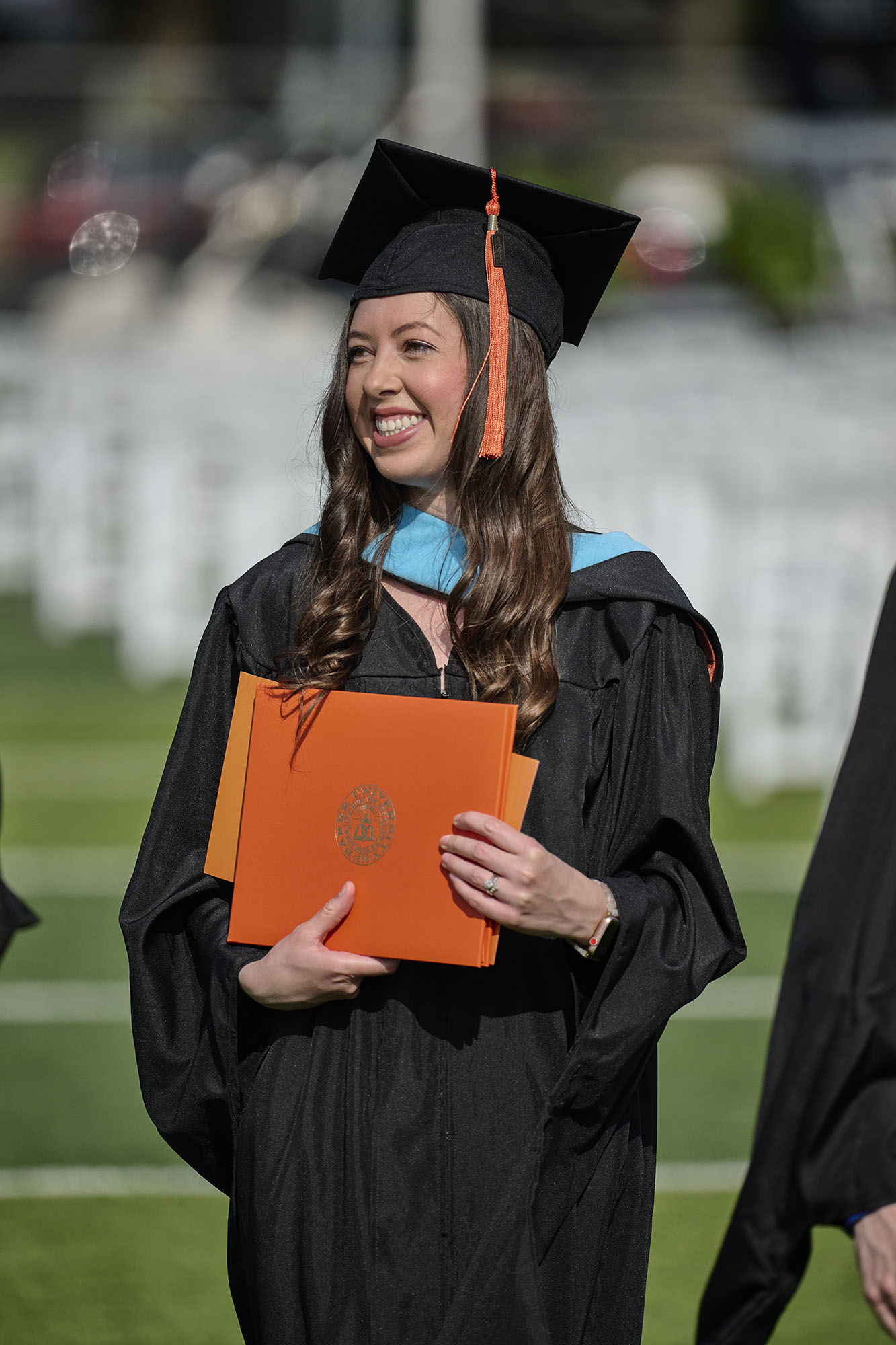
Scholarships
Education Majors
The Department of Education gives these awards with financial prizes to be applied to the following year’s tuition:
- Mildred Hunt Riddle Departmental Recognition Scholarship for Education
- Carol Lee Miller and Carla Miller Reynolds Scholarship
- E. Vincent “Doc” Reichley Scholarship
- Helen Bauer Endowed Scholarship
- Rose Lister Goertz Scholarship
- Clara Louise Johanning-Dufrene Scholarship
- Dan and Peggy Harris Scholarship
Meet the Faculty
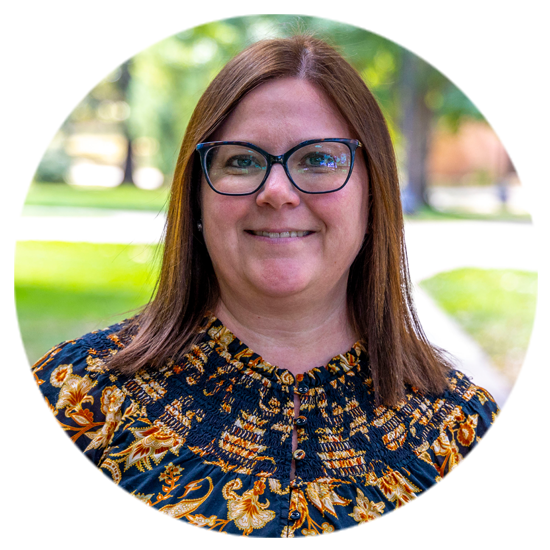
Dr. Charlsie Prosser
Department Chair, Professor of Education
B.S. Austin Peay State University, M.S. University of Missouri at Kansas City, Ed.S. Austin Peay State University, Ed.D. Baker University
Office: Case Hall 200
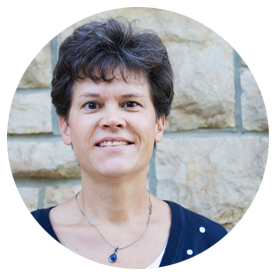
Dr. Amy Wintermantel
Professor of Education
B.A. Bethany College; M.S. Emporia State University; M.S., Ph.D. Kansas State University
Office: Case Hall 202
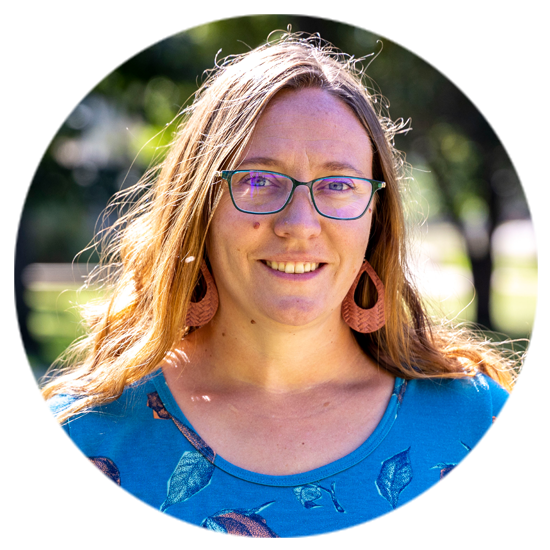
Dr. Tara Burnham
Assistant Professor of Education
B.S. Baker University, M.L.A. Baker University, Ph.D. Walden University
Office: Case 202
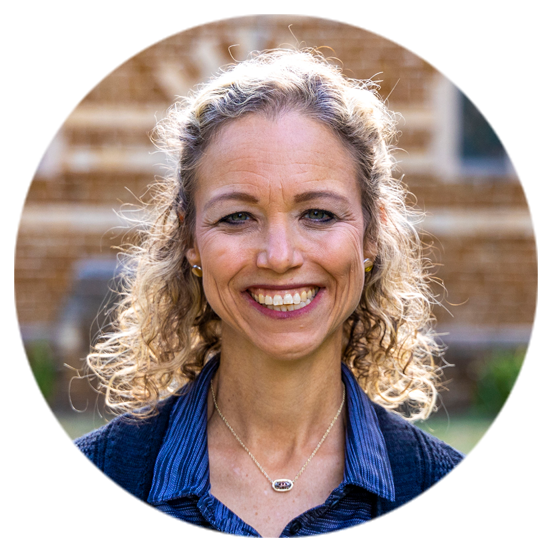
Dr. Regan Dodd
Assistant Professor of Physical Education
B.S. Northwest Missouri State University, M.S. Northwest Missouri State University, M.B.A. Baker University, Ph.D. University of Kansas
Expertise: health and physical education
Office: Case 201
